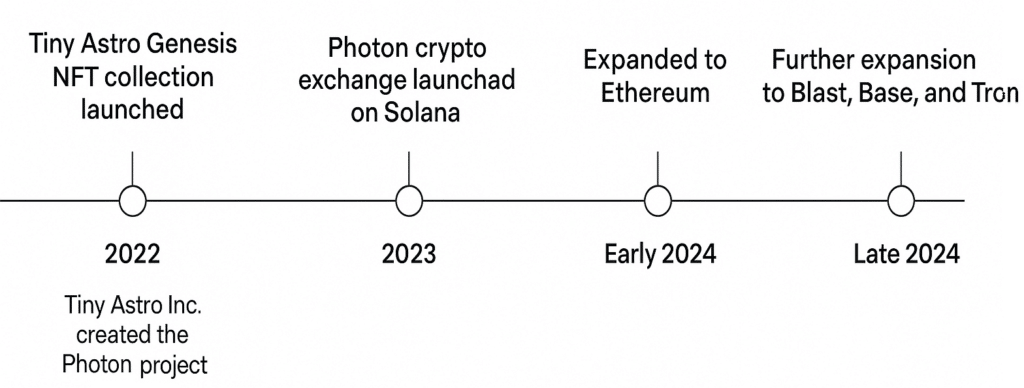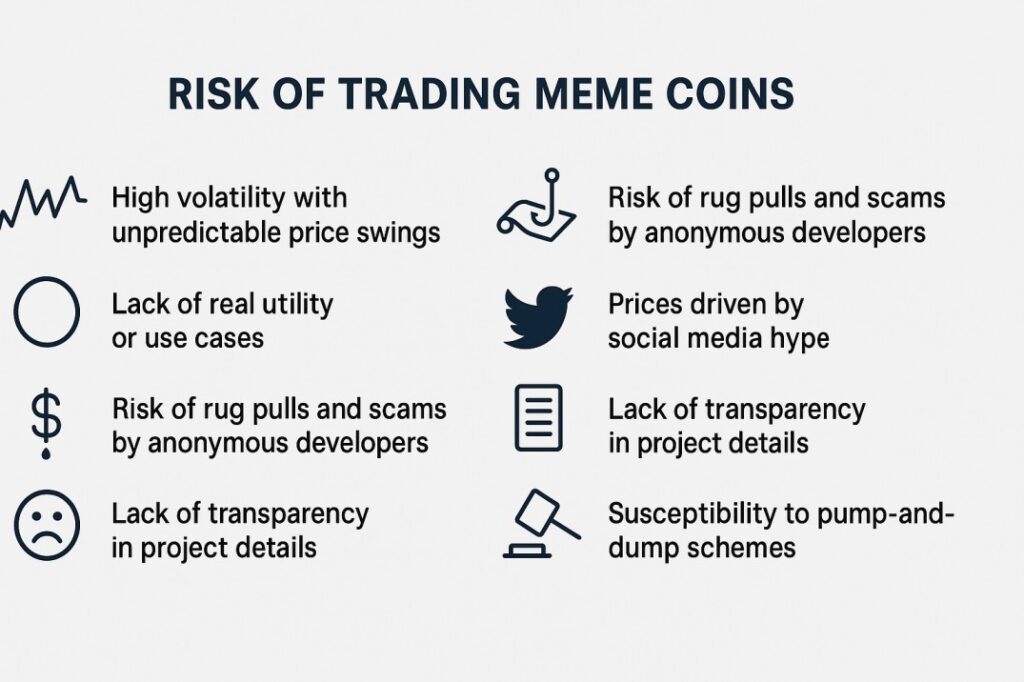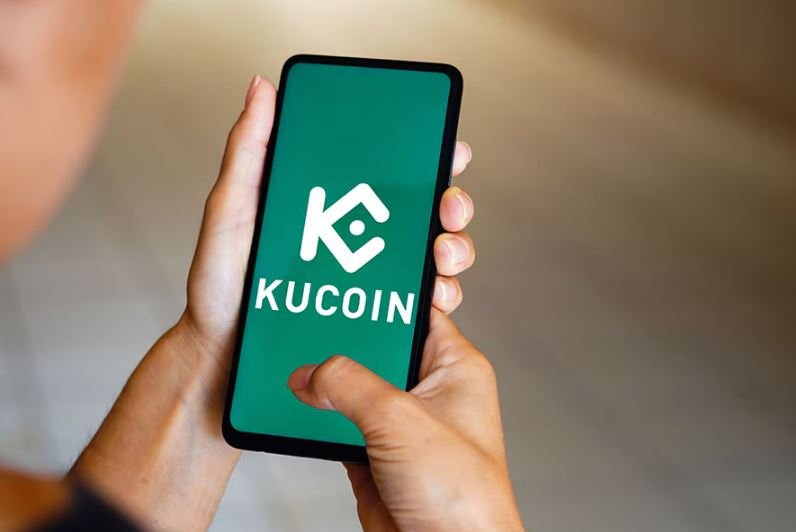Close search
By Mensholong Lepcha
Last Updated: Apr 9, 2025
Co-author
By Shraddha
Photon DEX is a decentralized exchange on Solana built for speed—thought to be perfect for traders chasing memecoins and newly launched tokens. It’s still gaining traction but already positioning itself as one of the top Solana DEX platforms. The big question is: Can it actually help you stay ahead in this fast-moving crypto market?
If you’ve spent any time trading crypto, you know how quickly things can change. Prices can spike or crash in seconds—especially with obscure tokens that run on hype and short cycles. That’s why platforms like Photon on Solana are catching attention. With low fees, lightning-fast execution, and real-time data, Photon crypto trading aims to give active traders an edge.
This guide will explain how Photon DEX works, what makes it stand out, and how to start trading on the Photon crypto exchange.
This article provides a detailed review of the Photon trading platform, covering everything you need to know about the Photon crypto exchange on the Solana blockchain. By the end of the article, you will learn what Photon is all about and whether it suits your crypto investing strategies. To give readers a complete understanding of the project, we also cover Photon’s history and talk about its founders.
In the second half of the article, we discuss Photon’s top features and fee structure. You’ll also find a step-by-step guide to trading on Photon, including spotting and buying some of the best memecoins. We will also compare alternatives such as Jupiter and Best DEX. Note that this article will mainly focus on the Photon crypto exchange and whether it fits your crypto trading strategy.
Photon is an on-chain trading platform on Solana where you can analyze market trends and snipe trending tokens, including new and popular memecoins. The platform is built for speed, allowing you to discover newly listed cryptocurrencies and buy and sell them in one click. This platform originally started on Solana before expanding to Ethereum, Blast, Base, and Tron.
It is one of the best decentralized exchange (DEX) aggregators on Solana. It offers a feature-rich platform that compiles tokens from multiple on-chain exchanges and the top crypto launchpads. As a decentralized exchange aggregator, Photon sources trading pairs from seven DeFi protocols on the Solana blockchain: Raydium, Pump.fun, Pump.swap, Moonshot, Memelive, Orca, and Meteora.
Photon launched in late 2023. Since then, the crypto trading platform has attracted over 1.3 million users and surpassed $40 billion in total trading volume on the Solana blockchain, according to on-chain data from Dune Analytics. The platform’s emphasis on speed and usability has been a key factor in its growing adoption, as per the Photon team.
“In the world of token launches and trading, every second counts, and it’s why so many people trust Photon to provide them with this edge in speed and execution when it comes to everyday trading-” Photon Team.
The Photon crypto project was created by Caribbean-based Tiny Astro Inc. The same company started an on-chain analytics and trading platform for non-fungible tokens (NFT) in 2022. According to official records, Tiny Astro Inc. is registered in the British Virgin Islands.

The team behind Tiny Astro and Photon consists of eight full-time members, including creatives, product designers, and engineers. The company’s core team has worked together for over a decade in launching and scaling startups. According to official documents on Tiny Astro’s Discord channel, members of their founding team have also been recognized by the Forbes 30 under 30 program for their accomplishments.
Tiny Astro and Photon were co-founded by @mintcollectible and @piemonsterx, who go by their X handles rather than public names. The company did not reveal their identities, which is a common practice in the crypto industry. Tiny Astro said that its co-founders are entrepreneurs with over a decade of experience scaling consumer tech startups.
While no public information is available about Tiny Astro’s funding sources, we know that the project began with the launch of an NFT collection called Tiny Astro Genesis in July 2022. The collection was launched at a price range of 0.095 ETH to 0.18 ETH per token. It originally featured 5,888 one-of-a-kind tokenized artworks minted on the Ethereum blockchain.
In 2023, Tiny Astro launched the Photon crypto exchange on the Solana blockchain. In early 2024, Photon expanded to the Ethereum blockchain. By the end of 2024, Photon was available on Blast, Base, and Tron. During the year, Photon launched new advanced trading features such as limit orders, dollar cost averaging (DCA), and maximal extractable value (MEV) protection. The platform also integrated its trading system with DeFi platforms such as Meme.Live, Raydium, and Aerodrome to introduce new pairs for trading on Photon.
Snipe trading newly launched cryptocurrencies can be a high-risk, high-reward crypto strategy to make money. In the highly volatile and unpredictable on-chain crypto market, speed, research, and effective trade execution are key factors that can make or break your trading operation. Typically, snipe traders monitor market data to identify new tokens that showcase high probabilities of increasing in price. Once the trading pairs are identified, snipe traders quickly place their bets or risk missing out on trading opportunities.
A crypto snipe trading operation typically involves three steps: monitoring, analysis, and trade execution, all of which can be done on the Photon trading platform. This one-stop platform for snipe traders enables users to discover token pairs, analyze market trends, study on-chain and technical statistics, and place orders with its one-click setup.
Whenever a token pair is created and listed on a partner trading platform such as Pump.fun or Raydium, the new pair is immediately available on Photon’s website. To aid market research, Photon has an in-depth token analysis interface that shows actionable metrics such as price movement, liquidity volume, transaction count, risk alerts, holder details, and whale holdings. Meanwhile, advanced trading tools such as MEV protection ensure that user trades are not subjected to frontrunning and sandwich attacks.
Of course, not everyone wants to chase risky memecoin launches in real-time. If you prefer early access to vetted opportunities, check out our curated list of the best crypto presales.
Photon Trading platform is loaded with advanced trading and analytics tools. Let’s go through them one by one:
Photon is a crypto trading platform that requires users to log in using a crypto wallet before beginning to trade. Users must ensure that they have enough gas fees to execute on-chain trades. The platform exists on multiple blockchains, such as Ethereum, Solana, Base, Blast, and Tron. Each version of Photon functions independently from the others. Note that the Solana version of Photon requires users to hold SOL tokens to pay for gas, while Photon’s Ethereum version requires users to pay for gas in ETH.
On Solana, Photon’s protocol reads the Solana blockchain ledger to list new token pairs created on partner DEXs and token launchpads. Whenever a user places a trade order, the transaction request is sent to validators on Solana, who are responsible for executing and finalizing trades. Photon traders can send a tip (also known as a bribe in crypto) to validators to improve their chances of landing their transactions. Validators typically place transactions with higher tips at the front end of the execution queue.
Traders on Photon have to pay gas fees to blockchain validators. Public blockchains such as Solana and Ethereum do not have a centralized operator to facilitate transactions. Instead, they depend on a decentralized community of validators to process transactions. Validators are incentivized to carry out their tasks honestly through crypto rewards. Gas fees are a part of this incentivized scheme and are thus pocketed by blockchain validators.
Crypto traders will also have to pay a platform fee to Photon to use its services. Photon charges a 1% fee on every buy and sell transaction that is collected in the SOL coin on the Solana blockchain.
So if you send 10 SOL to buy 1000 MEME tokens, you must pay a fee of 0.05 SOL (5 x 0.01). Similarly, if you sell 1000 MEME tokens for 1 SOL, you will pay a fee of 0.01 SOL.
Are you looking for a crypto exchange that offers more features than Photon?
Check out our expert-curated list of the Best Crypto Exchanges in 2025.
Here is a trading guide that will help you start trading memecoins and newly minted tokens on Photon. Before you start, you will need the Phantom wallet to log in to the Photon platform on Solana.
Here is a step-by-step guide to trading memecoins on Photon. We recommend that users use the platform on their desktops and laptops for a better experience.
Visit the Photon Exchange
Select Solana Network
Connect Your Wallet
Create a Photon Trading Wallet
Confirm Key Backup
Fund Your Wallet with SOL
Start Trading on Photon
That’s it! Once your Photon wallet is set up and funded, you’re ready to explore and trade Solana-based tokens using Photon’s fast, feature-rich interface.
Photon Crypto has gained attention for its innovative approach to decentralized infrastructure, yet it notably lacks a native token. This strategic decision sets this DEX apart from many blockchain projects. You may ask, what’s the advantage of not having a token? Well, avoiding a token can help the project steer clear of regulatory complications, especially in regions with strict rules around crypto securities and token offerings.
Not all cryptocurrency projects have native tokens. Most crypto projects do not need native tokens and can function without them. Photon is one such project that does not have a native Photon crypto token at the moment. Another prime example of a successful crypto project without a native token is the Base L2. Since users pay gas fees using ETH on Base, the L2 blockchain can function without a native token. If you want to learn more, check out our comprehensive Base review.
Similarly, on Photon, SOL is used to pay gas fees and as the primary trading token. In the future, Photon may choose to create a native token if its core development team feels the need to introduce new mechanisms, such as decentralized governance, incentivized liquidity pools, or discount programs.
Photon only allows users to log in to its platform using the Phantom crypto wallet on the Solana network.
Phantom is a non-custodial crypto wallet that is available to download for free as a mobile application or as a browser extension. The Phantom wallet is known for its clean design, user-friendly interface, and rich features. The wallet has a dedicated tab to display and manage NFT tokens. Third-party onramp integrations allow users to easily buy cryptocurrencies using their debit and credit cards directly from the Phantom Wallet. Meanwhile, an in-built web3 browser on the Phantom Wallet lets users log in to the Photon Trading platform from their smartphones.
Phantom originally started as a crypto wallet application focused on the Solana blockchain ecosystem. It has since expanded to support Bitcoin, Ethereum, Base, Sui, Polygon, and Monad.
If you’re using or considering Phantom, don’t miss our detailed Phantom Wallet review.
In this section, we compare Photon with Jupiter crypto exchange, one of the most established DeFi protocols on Solana with a market cap of over $1 billion. While Jupiter dominates in scale, Photon is a newer platform that’s quickly gaining attention for its features and growing user base.
Jupiter is the most popular DEX aggregator and the top Solana project, connecting users with liquidity pools across 20 Solana-based exchanges, offering the best exchange rates and the lowest fees. On the other hand, Photon is a memecoin trading platform that enables users to discover token pairs, analyze market trends, study on-chain and technical statistics, and place orders with its one-click setup.
Photon caters to a niche crowd. The platform is built for memecoin trading, and memecoins are not a good fit for everyone. It is a highly risky strategy that can leave traders exposed to rug pulls and pump-and-dump schemes.
Since Photon prioritizes speed, users will find new, unknown, and unaudited tokens on its trading platform. Memecoin projects have showcased a worrying history where developers abandoned the project after raising funds. Some memecoin have also turned out to be honeypot scams where holders can buy but not sell the tokens. To the credit of Photon, the platform does audit memecoin and highlights risk factors involved in each project. However, it is up to the trader to research coins and tokens before investing their money.

While Photon is an incredible tool for memecoin traders, it may not be the safest option for beginners or risk-averse users. If your priority is security, convenience, and peace of mind, Best Wallet provides a compelling alternative for trading crypto assets directly within your wallet. Best Wallet comes with an in-built DEX aggregator called the Best DEX. This means that you don’t have to connect your crypto wallet to third-party websites when trading cryptocurrencies on-chain.
Best Wallet is a non-custodial crypto wallet known for its ease of use and rich features. The application can be downloaded for free on your smartphone from the Apple App Store and Google Play. New users will be able to start using Best Wallet within seconds because of its easy setup process that does not require them to manage and secure secret recovery phrases. For convenience’s sake, Best Wallet allows users to back their wallets to their cloud storage.
The wallet supports multiple blockchains, including Bitcoin, Ethereum, Polygon, and BNB Chain. The inbuilt on-chain exchange, Best DEX, aggregates over 50 DEXs from supported blockchain networks to enable users to swap their tokens at the most cost-efficient trade routes, ensuring the best exchange rate and lowest fees.
Best Wallet is a no-KYC, mobile-first crypto wallet available on the Google Play and Apple App Store, with over 100K downloads to date. Known for its user-friendly interface, the app offers powerful features like token launchpad, fiat onramp, and cross-chain swaps. To learn more, check out our full Best Wallet Review.
Here are the top features of the Best Wallet:
Pros
Cons
Visit Best Wallet
Yes, Photon is a safe trading platform. However, readers must note that it is their sole responsibility to conduct thorough due diligence before investing in memecoins. Memecoins are highly volatile and risky assets. Photon provides the required analytical tools to help you filter out bad projects and risky tokens; however, you must take the initiative to conduct deep market research before investing.
If you’re looking for a simple way to trade, Best Wallet lets you buy and sell popular cryptocurrencies like ETH, SOL, and BTC with ease. To find the best options for day trading, just check out the top coins and tokens by market capitalization.
Here’s what on-chain traders are saying about the Photon Trading platform.
X user @satori_psyops praised Photon’s features for monitoring KOLs (Key Opinion Leaders) on X.
Another crypto trader, @henri_sol, said:
“Shoutout Photon’s migration sniper feature and wallet tracking feature, wouldn’t be possible without it. There’s a reason I have only used Photon since the start of this bull run. Genuinely the apple of trading bots.”
However, not all the reviews on Photon were positive. Reddit user Merujioh noted that their experience on Photon was “not a good experience overall” due to failed trades and lag. Merujioh also added that they faced issues withdrawing SOL from Photon’s trading wallet to the Phantom Wallet.
“When I tried to withdraw my sol to my Phantom wallet, I had issued withdrawing max…. they had no guidance on fees/minimum transfer amounts. Looks like about $2 usd left in protons wallet that I cant get out,” – Merujioh on Reddit.
Photon on Solana is a niche trading platform best suited for experienced memecoin traders. Users looking for fast execution and advanced trading tools can use Photon to enhance their memecoin trading operations. Custom trading presets, MEV protection, and memescope are excellent trading tools that we want to highlight. Overall, Photon is well-positioned to become a core component of Solana’s memecoin trading ecosystem. Traders should keep a close eye on Photon as it continues to evolve.
Photon is an on-chain trading platform where you can analyze and snipe trending tokens. The platform is built for speed, allowing you to discover newly listed cryptocurrencies and buy and sell them in one click.
You should use Photon if you are interested in trading memecoins. The platform is specially built to execute fast trades and monitor newly-created memecoins.
You will need a Phantom crypto wallet to get started with trading tokens on Photon on the Solana blockchain. You will also need SOL coins to pay for gas fees and to trade memecoins.
Yes, Photon is a safe trading platform to use. However, readers must note that it is their sole responsibility to conduct thorough due diligence before investing in memecoins.
On the Solana blockchain, Photon aggregates crypto trading pairs listed on seven DeFi protocols, namely Raydium, Pump.fun, Pump.swap, Moonshot, Memelive, Orca, and Meteroa. All tokens available on these platforms can be traded on Photon.
The main benefits of using Photon are features such as trading presets, quick buy/sell, MEV protection, live pairs feed, stop-loss and limit orders, and memecoin monitoring.
Photon helps traders avoid scams by auditing memecoin projects based on their smart contract risks, locked tokens, honeypot alerts, and developer and whale holdings.
You cannot buy Photon crypto as the platform does not have a native token.
Photon is a memecoin-focused trading platform on the Solana blockchain. It is also available on Ethereum, Tron, Base, and Blast.
According to official documents, Photon charges a 1% fee on every buy and sell transaction that is collected in the SOL on the Solana blockchain.
Photon on Solana only supports the Phantom wallet.
No, Photon does not have its own token.
Best DEX and Jupiter are some alternatives to Photon for crypto trading. However, these platforms do not specialize in memecoin monitoring and trading. Interestingly, users can visit the Best Wallet DEX to gain access to exclusive crypto presales as well.
Established in 2013, 99Bitcoin’s team members have been crypto experts since Bitcoin’s Early days.
Weekly Research
Monthly readers
Expert contributors
Crypto Projects Reviewed
Mensholong is a experienced crypto and blockchain journalist. He has contributed with news coverage and in-depth market analysis to Reuters, Capital.com, StockTwits, XBO, and other publications. In his spare time, Mensholong enjoys watching soccer, finding new music, and buying BTC… Read More
Maximize Your Trading With Margex’s 20% Deposit Bonus
Hottest Meme Coins to Buy in April? Retail Target Latest Crypto For Mega Gains
AR.IO Brings The Permanent Cloud to AI Storage Crisis
10 Best Crypto Bonuses in 2025 – Top Exchange Offers & Promotions
4 Days Left For Early Investors in World’s First Meme Coin Index: Meme Coin Mcap Hits $56Bn
Best Crypto Exchanges in Hong Kong for 2025
Best Fiat-to-Crypto Exchanges 2025
Best Crypto Exchanges in Japan for 2025
Best Canadian Crypto Exchange in April 2025
CoinEx Review 2025: Earn More from 1,400+ Altcoins
7 Best No-Fee Crypto Exchanges in April 2025
Let’s get social
© 2025 99bitcoins LTD, All rights reserved
Stay ahead with the latest updates, exclusive offers, and expert insights! Sign up for our newsletter today and never miss a beat.





